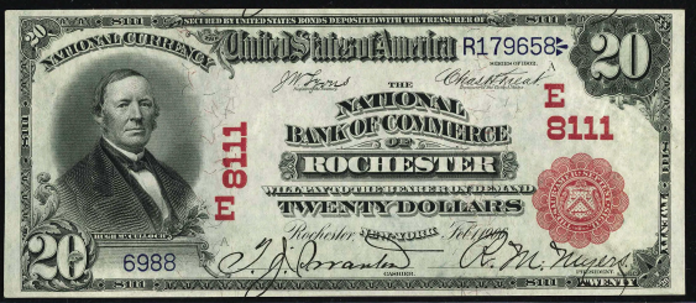Twenty Dollar Notes › Nationals › 1902 Twenty Dollar National Bank Notes › Massachusetts Charters › 1902 $20 Reading Massachusetts First National Bank
Get Value Now
| Item | Info |
|---|---|
| Series | 1902 |
| Charter | #4488 First National Bank of Reading, Massachusetts |
| Year Chartered | 1890, 304 Banks Chartered |
| City Info | Reading is a town in Middlesex County, Massachusetts, United States, 10 miles north of central Boston. The population was 24,747 at the 2010 census. Many of the Massachusetts Bay Colony's original settlers arrived from England in the 1630s through the ports of Lynn and Salem. In 1639 some citizens of Lynn petitioned the government of the colony for a "place for an inland plantation". They were initially granted six square miles, followed by an additional four. The first settlement in this grant was at first called "Lynn Village" and was located on the south shore of the "Great Pond", now known as Lake Quannapowitt. On June 10, 1644 the settlement was incorporated as the town of Reading, taking its name from the town of Reading in England. Source: Wikipedia |
| Similar Cities | If your note doesn't match try: 1. Reading, Pennsylvania - First National Bank 2. Reading, Pennsylvania - National Union Bank 3. Reading, Pennsylvania - Farmers' National Bank 4. Reading, Pennsylvania - Keystone National Bank 5. Reading, Pennsylvania - Commercial National Bank 6. Reading, Pennsylvania - Second National Bank 7. Reading, Pennsylvania - Penn National Bank 8. Reading, Pennsylvania - Reading National Bank |
| Seal Varieties | Red, Blue |
| See Also | If your note doesn't match try: 1. 1905 $20 Gold Certificate 2. 1906 $20 Gold Certificate |
| Other Info | 1. Value depends on notes known for charter, condition and market demand. |
| Neat Fact | Date Backs issued in sheets of 4 Notes: 3 $10 Notes, 1 $20 Note. Less commonly 4 $20 Notes (Friedbergs, 20th Ed. P130) |
No Obligations Offers and Appraisals
Please submit a good photo or scan. It will be identified and evaluated. Understand there may be subtle differences between the image you see above and your note. Signatures, design, markings and note condition will determine the offer price. Notes in Uncirculated or better condition receive the best offers.
Appraisals can be estimated for wholesale and retail prices. Wholesale is what dealers typically pay. Retail is what a collector might pay. Retail is slightly higher in most cases.
Please visit this page for USA Paper Money Reference. Do not treat this page as a reference guide, it is for appraisal and acquisition purposes only.
